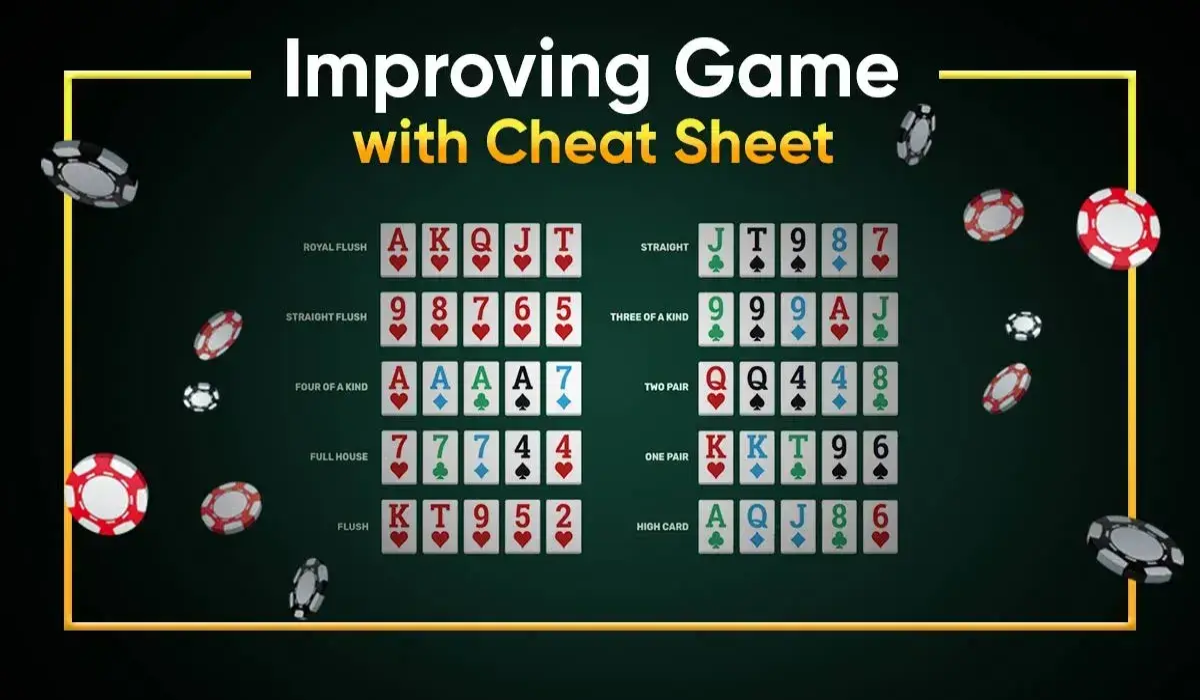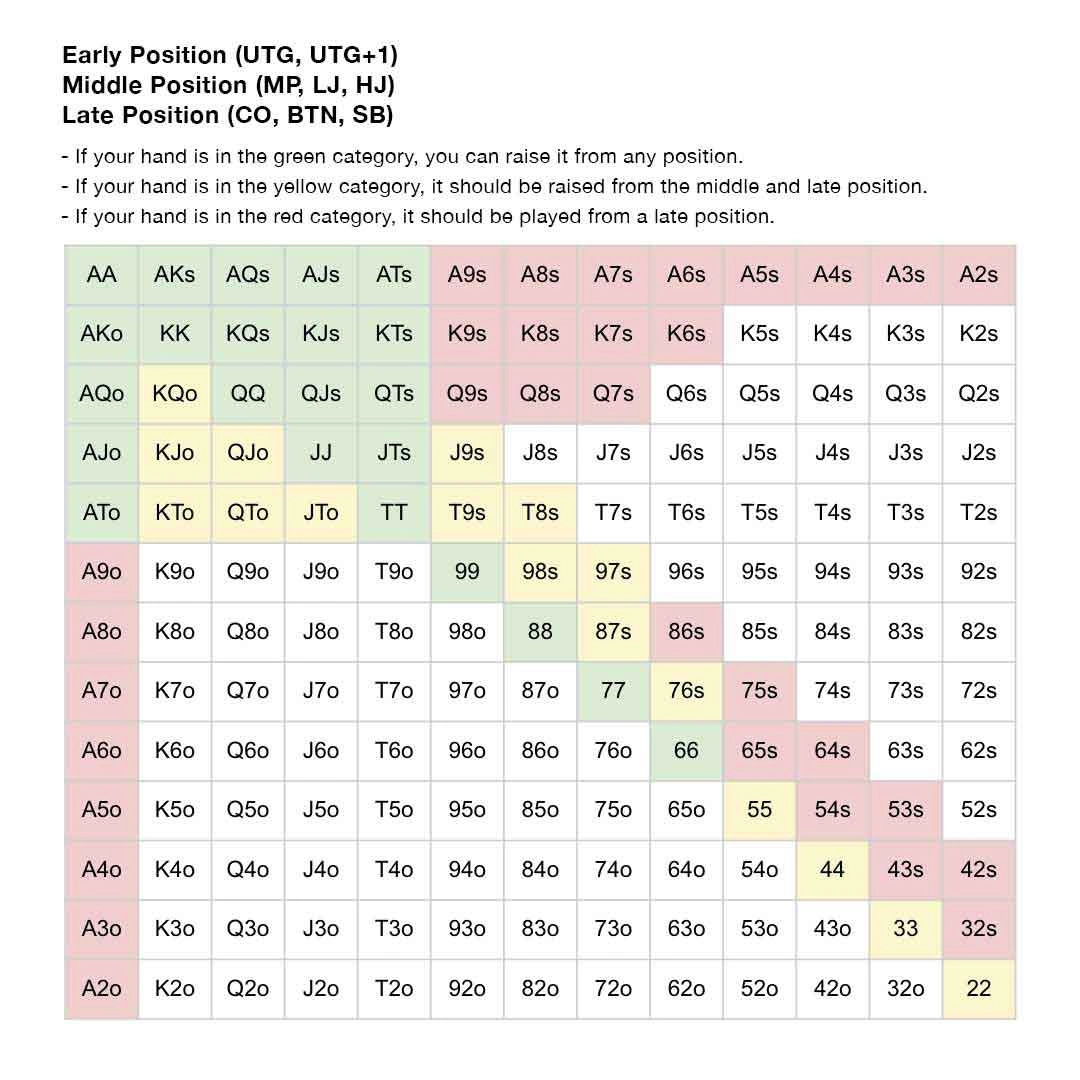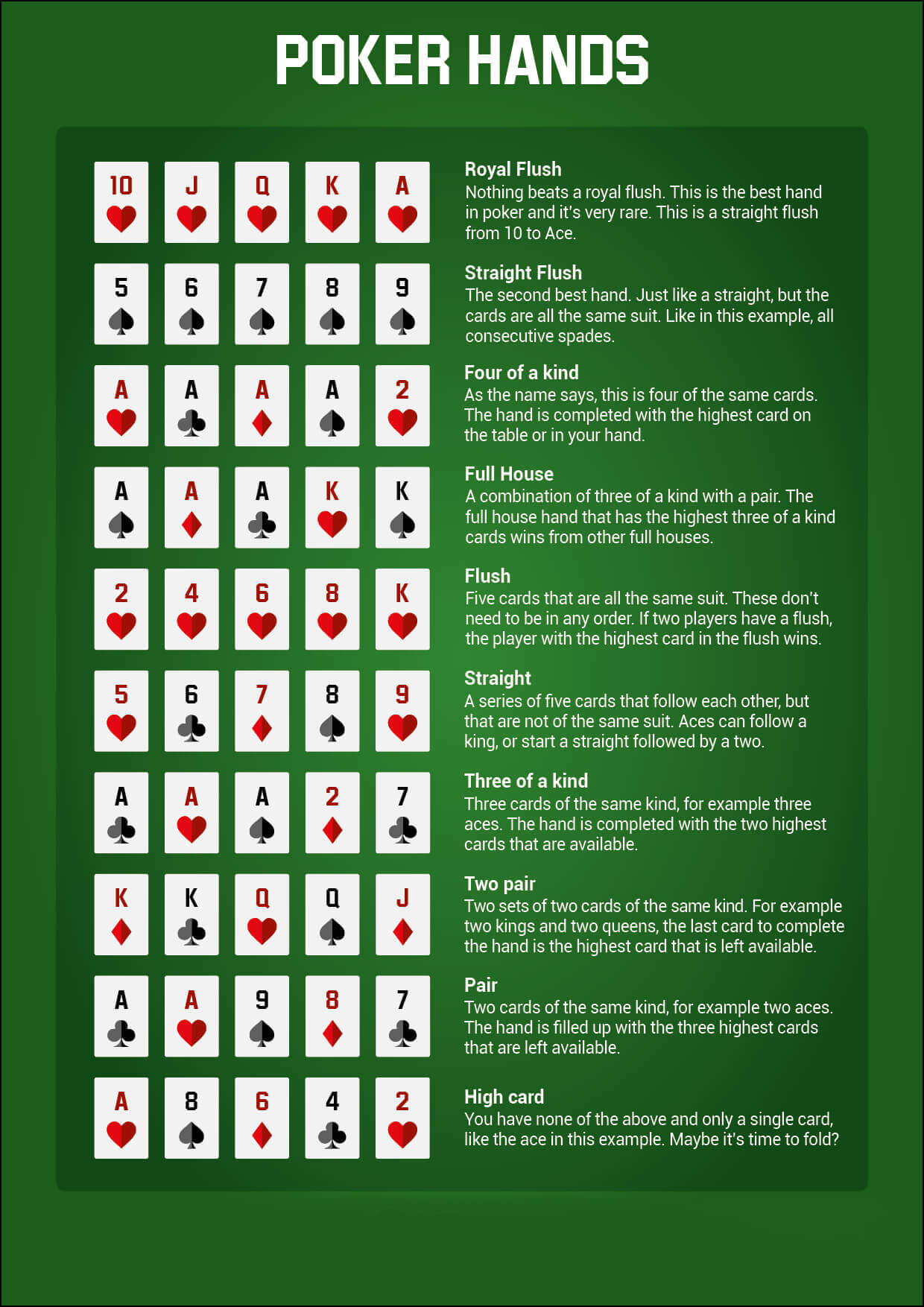
Ultimate Poker Cheat Sheet for Beginners
🗝️ Key Takeaways
- Poker cheat sheets are one of the best ways to increase your learning speed. They provide you with immediate reference for important strategies and hand rankings. They guide you in developing the practice habits that lead to better long-term decision-making.
- Cheat sheets reduce in-game anxiety and frustration. They are an invaluable and incredibly convenient reference tool, allowing you to focus on mastering your strategy rather than second-guessing your decisions at the table.
- Understand starting hand selection, positional play, pot odds, and betting terminology, among other fundamentals, with useful cheat sheets. Whether you play tournaments or cash games, this practice will increase your edge within any poker format.
- Tailoring your cheat sheet to specific poker games, like Texas Hold'em or Omaha, ensures relevance and accuracy, helping you adapt to different game dynamics.
- Cheat sheets can be a great tool, but don’t lean on them too much or you’ll stunt your development. Consider these five as your roadmap. Continue to pay attention to the dynamics of the table and continue to revise your material as your level of skill advances.
- Integrate ethical considerations as part of aid use. Make sure you’re upholding your house’s rules in online or live play and avoid shady tactics to keep play fair and enjoyable for everyone.
A poker cheat sheet is an incredibly useful tool, acting as a quick reference guide. It breaks down important rules, strategies, and hand rankings so you can focus on developing the mindset of poker. If you’re starting out with poker, it’s the perfect poker cheat sheet for beginners.
If you’re a budding novice, the game soon teaches you the basics of hand selection, pot odds, and table positioning. When to fold, when to raise or call, it all becomes second nature with simple rules available at a moment’s notice. Engineered to cut down on confusion and save players time, it’s a must-have when practicing or playing casual rounds.
We’ve put together a simple cheat sheet that will give you the clarity you need to gain confidence, avoid costly mistakes and start making money at the poker table. Check out the cheat sheet sections to find out how to apply these tried and tested approaches to the game at every skill level and poker format.
📖 Why Use Cheat Sheets For Poker?
Cheat sheets really can be an incredible resource for players of all skill levels. They serve as a road map to fortify your game, sharpen your decision-making ability and keep you out of bad plays that can cost you dearly. By simplifying the most important concepts and strategies, cheat sheets can give you real-time, practical support at the table without a ton of info overload.
🚀 Accelerate Your Poker Learning Curve
Cheat sheets simplify the learning process by clearly delineating what makes the best move or what beats what. They show you the optimal hands to play in Texas Hold’em. This guide will assist you in honing in on a strong range while folding out of the hand weak holdings.
By reviewing these sheets, you can proactively pinpoint the weaknesses in your overall gameplay and rectify them in real time. You should be able to raise 54% of hands open from the button when you have deeper stack sizes. This understanding is key to tremendously improving your counter-power potential to use your perch to your advantage.
This focused direction allows you to learn at a much quicker pace than learning by doing alone.
🛠️ Build Foundational Strategy Habits
Creating good habits is so important in poker, and cheat sheets lead to more disciplined choices. They focus on the basics. Playing in-position advantages and out-of-position disadvantages and working with balanced ranges often results in higher quality play in the long term.
These habits just take practice, and soon enough they’ll be second nature. This will help you to be better prepared to make more knowledgeable choices instead of just depending on the cheat sheet.
🧩 Reduce In-Game Decision Anxiety
Poker is a game where you need to be mentally locked in and cheat sheets take off the burden of making on-the-spot choices. Having objective, specific reference points gives you the clarity to process situations as they unfold and avoid the trap of second-guessing or emotional reactions.
This psychological edge will enhance your confidence when playing, particularly in those high-pressure table stakes.
🧭 Reference Tool, Not Crutch
Cheat sheets are meant to enhance your talents, not do the work for you. Today, it’s all about poker cheat sheets and how they can help you learn more. Though they’re wonderful, over-relying on them can end up hamstringing your own development.
Using them in the right way makes sure they don’t become a crutch and that they stay a great tool.
🃏 Complete Poker Hand Rankings Explained
Whether you prefer to play live or online, knowledge of poker hand rankings is key to helping you make the best decision every time. These rankings are what dictate how strong your hand is and which hands come out on top at the table.
Starting with the awe-inspiring Royal Flush all the way to the simple High Card, here’s a full ranking and rundown on every poker hand.
1. Royal Flush: The Unbeatable Hand
In summary, a Royal Flush is the highest hand possible in poker and it’s unbeatable. It consists of the Ace, King, Queen, Jack, and Ten in the same suit. This hand is incredibly unlikely. If you’re fortunate enough to hold onto it, it forms a potent combination that ensures victory.
2. Straight Flush: Sequential Suited Cards
A Straight Flush comprises five cards, all of the same suit, in sequential order. For instance, a hand containing 5, 6, 7, 8, and 9 of hearts would fit the bill. Not as powerful as a Royal Flush, but still a pretty fearsome hand.
3. Four of a Kind: Quad Power
This hand consists of four cards of one rank, like four Kings. It’s a very powerful hand, ranking just below a Royal Flush. It beats a 3 of a Kind but loses to a Straight Flush.
4. Full House: Three Plus Two
A Full House consists of three cards of one rank and two of another, e.g., three 7s and two 10s. This is the second-highest ranking hand below Four of a Kind.
📋 Essential Cheat Sheet Poker Elements
A poker cheat sheet takes the intimidating intricacies of poker and condenses them into easy-to-understand quick reference tools to help you make better informed decisions. By focusing on core elements like hand selection, position, pot odds, betting terms, and draw strength, you can effectively address critical aspects of your gameplay.
🎯 Master Starting Hand Selection
Smart starting hand selection sets you up for success. In Texas Hold ’em, playing a tight, aggressive range of premium hands is essential. In general, better start hands such as pocket pairs (Aces or Kings) or high-suited connectors (Ace-King suited) lay a stronger pre-flop foundation.
You’d be surprised how often playing weaker hands out of position will get you in very expensive trouble, so focus on quality over quantity. A good poker cheat sheet will allow you to easily spot the hands you should play, cutting down on costly misplays and increasing your overall winning potential.
♟️ Understand Positional Play Advantage
Control of the action position is one of the most important elements to poker strategy. Playing in a late position, especially from the Button (BTN), is the perfect scenario. It allows you to play last on every post-flop street, providing you perfect information as to your opponent’s actions.
This gives you the ability to play a lot more hands—often opening as many as 54% and at deeper stacks. On the other hand, when playing from early positions – such as Under the Gun (UTG) – a much tighter strategy should be adopted, only playing those strong hands.
The Small Blind (SB) is very polar. The SB needs to be polarized, having a nut-heavy range with just enough bluffs sprinkled in.
💰 Grasp Basic Pot Odds Quickly
The pot odds help make a decision to call, fold, or raise. For instance, if there’s $50 in the pot and a $10 bet, you’d need to contribute $10 to win $60, creating 6:1 odds.
By comparing this ratio to your hand’s specific odds of improvement, you can play with purposeful confidence.
✨ Decode Common Poker Betting Terms
Knowing the meaning behind words such as “check,” “raise,” or “3-bet” makes things a lot easier when playing hands. For instance, a “3-bet” is short for the third raise in a betting sequence, and it typically implies powerful holdings.
Understanding these key terms will be critical to communicating clearly at the table and adjusting your strategy accordingly.
⚖️ Recognize Strong vs Weak Draws
Draws just kind of ruin poker, changing the balance of everything. For example, a strong draw like a flush draw with overcards gives you many outs to make the right hand.
A weak draw, such as a gutshot straight draw, will have less outs and must be played more conservatively. Since draw strength is usually established on the flop, calculating your equity from the get-go is crucial.
🃏 Tailor Cheat Sheets To Game Type
Cheat sheets are an essential tool when learning the game of poker. Their effectiveness depends heavily on what game type you’re playing. The fundamental concepts of hand rankings and odds are the same across all formats.
Still, each game type requires a different, more particular strategy and FOCUSED DECISION-MAKING. Tailor your cheat sheet to accommodate the unique rules and gameplay of your variant. That preparation puts you in a position to overcome the unexpected challenges you’re forced to face.
♠️ Texas Hold'em Specifics
In Texas Hold’em, the importance of positional play and betting strategy is paramount. If you’re the player in late position, you can widen your range, 3-betting more often due to facing the opponents’ wider ranges.
The best players will tend to do this, making it raise or 3-bet more in late positions, understanding the value of having the last action. Against this, look for the surprise 3-bet, which can force a loss-averse opponent to fold when they fear they’re behind the action.
Keeping track of your outs is crucial. For example, if you possess a flush draw, you can count your five outs and multiply by four to figure that you have about a 20% chance of making your hand by the river.
🔍 Omaha Hand Value Differences
Omaha’s four hole card structure changes hand values drastically. While Texas Hold’em is often driven by high pairs, Omaha is all about those coordinated hands.
Druid or Sorcerer, a cheat sheet should focus on how to draw hands with straight or flush potential. In Omaha, the increased variety of potential combinations makes the game quite different.
A hand that is powerful in Hold’em isn’t necessarily as strong here.
🎲 Other Poker Game Considerations
Variants such as Stud or Razz add different dimensions to gameplay. Cheat sheets tailored for these types of games should focus on highlighting aspects that may differ such as capped betting structures or the importance of cards exposed.
Changing the approach to strategy means making decisions more strategically, no matter the format.
📝 Use Your Cheat Sheet Smartly
A poker cheat sheet is an invaluable resource, but your success will be determined by how well you use it. Because although poker is easy to play, it isn’t easy to win. To realize maximum value, consider carefully how you integrate your cheat sheet into your learning and gameplay in order to get the most out of it.

📖 Reference Before Key Decisions
Utilize your cheat sheet as a resource to help you take action. Use it to get a quick idea whenever you find yourself trying to gauge your hand strength/future potential.
For example, if you’re holding A♦K♦ and the flop comes down 4♦5♦9♠, you instantly realize you’re sitting on a diamond flush draw. With the cheat sheet, you can assess the chances of finishing your flush, weigh it against the pot odds, and determine whether to call or fold.
This systematic approach reduces the guesswork and makes sure that each step is based on solid information and analysis.
🎯 Focus On One Concept Per Session
Poker involves many concepts, from hand rankings to position play. When you try to learn all at the same time, it gets very intimidating.
Pick a concept from your cheat sheet, like learning about outs or pot odds. Next, plan at least one class to really focus on practicing that skill.
By taking it bite by bite, you not only reinforce what you’re learning, but you slowly get better at the game as a whole.
📊 Use For Post-Game Analysis
Post-session, hit your cheat sheet to recap key hands and see if they went through any notification or not. Examine calls you took for example, like whether or not going after that flush draw was a mathematically wise choice.
This process of reflection reveals blind spots, allowing you to pinpoint where things could be clearer or more engaging and sharpen your approach in subsequent iterations.
⚡ Integrate Concepts Into Instinct
With repeated use over time, muscle memory takes over in making the cheat sheet feel like second nature. The more you learn formulas such as position advantages or bluffing frequencies the less you will use the sheet.
Predictably, this shift will result in quicker, more confident decision-making.
⚠️ Avoid Common Cheat Sheet Pitfalls
Poker cheat sheets can be useful, but they have their limitations. Misuse at best produces common miscalculations that can kill your game at worst. Preventing these common pitfalls helps you get the most out of these tools while sharpening your craft.
🚫 Over-Reliance Stunts Growth
If you use a cheat sheet as a crutch, you’ll stunt your development as a player. As much as it’s a useful crutch to help make decisions, poker is an always-changing, fluid game and each spot is different.
For instance, in cash games players tend to get into a robotic play. They follow cheat sheet recommendations, not adjusting to what is happening in real time. This crucial approach oversimplifies the intricacies of reading opponents and learning the game of table.
Rather than just following the ranges without thought, pay attention to the “why” driving these recommendations. In MTTs with 100 BBs, the optimal opening percentage from UTG is around 10%. This is a very powerful strategy that makes you incredibly formidable in the game.
Understanding why these ranges go a long way into developing a deeper understanding, making you less reliant on the cheat sheet as time goes on.
💸 Ignoring Table Dynamics Is Costly
Poker is not an island game. Cheat sheets tempt to oversimplify, but the reality of table dynamics necessitates flexibility.
When faced with raises from early positions, like UTG or UTG+1, it’s prudent to let weaker hands go. These positions often indicate tight ranges, so bluffing is a dangerous play.
Conversely, playing from the Hijack (HJ) at middling stack depths allows more flexibility. You can play close to 30% of hands. Taking note of player tendencies, such as spotting “nits” (players who fold too much), allows you to target them and exploit them to the fullest.
Don’t bring hard and fast strategies and be flexible to the needs of the table.
🕰️ Outdated Information Leads Astray
Poker is a constantly changing game, and cutting edge strategies change and adapt. Going off old cheat sheets runs the risk of getting advice that is outdated and no longer relevant.
Continue to update your go-to resources to reflect new trends and strategies so that you continue to maintain a modern, effective strategy.
📝 Create Your Personalized Cheat Sheet
The cheat sheet comes in 2 different variations. It provides essential analysis to supercharge your strategy as you play! Whether you're an experienced player or a beginner, building your own cheat sheet tailored to your needs can significantly enhance your game.
Here’s how you can make one better than anybody else.
🔍 Identify Your Weakest Areas
First, begin by identifying what you’re doing well and what you can work on. For example, maybe you have a hard time knowing what to do preflop, so your goal should be to develop a preflop range chart.
This chart might be a place to define things such as hands to open from each position. At a nine handed table, you need to play a much tighter hand range when you’re in the UTG position. The chances of winning from there are just 1 in 82.
Making sure to call out such particulars on your cheat sheet makes sure you’re ready to fight the battles that matter strategically.
💡 Add Notes From Experience
As always, your experiences at the table will prove to be most valuable. Take note of the trends you’ve noticed. Pay attention to how opponents react in certain spots and keep record of how often you under or over bet too much.
These individualized, tailored-in-real-time notes can help direct you to play stronger moving forward hands. Your cheat sheet changes from a static one page document to an ongoing strategic playbook.
✂️ Keep It Concise And Clear
A cheat sheet is best when it’s user-friendly and readable at a glance. Provide complex information clearly. Use simple layouts, such as bulleted lists or tables, to sort related information.
This is how preflop range charts would look divided into sections for a 6-handed table. They break down playable hands by position.
🔄 Update As Your Game Evolves
Poker strategies are not a one and done affair, and neither is your cheat sheet. Reassess and revise it frequently, particularly after big play sessions or learning about new strategies.
Resources like those found at VistaGamble can provide motivation to make needed improvements.
⚖️ Ethical Considerations Using Aids
Just as poker players tread the line between fairness and strategy, it is important to recognize the ethical considerations when using aids. Whether you’re playing online or live, adhering to rules and respecting the game’s integrity ensure a level playing field for all participants.
🎰 Online vs Live Game Rules
The boom of the online poker industry has lended itself to some new challenges that are quite different from live environments. Live games are heavily reliant on players being able to read and adapt to how their opponents are behaving.
Online, platforms rarely capture these key physical signals. This has sparked discussions about ethical use of tools such as Heads-Up Displays (HUDs) and hand histories. Others contend that these aids allow for strategic deepening.
They pose fairness questions, particularly because not all players have equal access to them. Online operators such as PokerStars are extremely diligent in enforcing rules to protect against these potential issues. High-stakes players are subject to more severe sanctions for infractions.
This is due to the fact that the level of stakes on the line as well as the level of experience of the player is considered. This practice emphasizes an important principle of equity, making sure violations are penalized in a way that fits the transgression.
🤝 Maintaining Game Integrity Always
Given poker’s zero-sum nature, ethical integrity is of the utmost importance. Players might have to make the most difficult decisions of all—decisions that cause them to harm their friends—but competition demands it.
Ethical breaches—like collusion or using forbidden software—are corrosive to trust. Operators need to design safe spaces to begin with. They place such penalties as Annette’s seven-day “time out” for violators.
Considering that 70% of players are cheating as one of the most significant breaks in trust, trust is a key linchpin. If something feels off during a game, trusting your instincts and voicing concerns or exiting is vital for maintaining fairness.
🔒 Conclusion
There’s no doubt that a great poker cheat sheet can completely change the game at the poker table. In turn, it keeps you focused, allows you to be decisive and prevents you from making expensive errors. With the rankings, strategies, and important details on hand, you’ll enter the game ready to play with confidence and purpose. The best poker cheat sheet isn’t a crutch—it’s an instrument to help you learn the game better and continue to get better at it over time.
As always, make sure to adapt it to the realities of your game, use it wisely, and study every play session. In poker, the process is as important as the outcome. Poker is a game of improvement and winning. Creating a great cheat sheet may take some time, but it’s one additional step to playing with more smarts, more strategy. Make your cheat sheet for poker today and experience the difference it makes in your game!
Frequently Asked Questions❓
What is a poker cheat sheet?
A poker cheat sheet is just that, a cheat sheet. It allows players to learn valuable concepts like hand rankings, probabilities, and turning strategy. In summary, it’s one of the best tools first timers can use to improve their decision-making in real time.
Are poker cheat sheets legal?
The answer almost always is yes, poker cheat sheets are legal. They are usually not HD in live tournaments or casinos. As always, make sure to read up on the specific rules of whatever game or house you’re playing in.
How do cheat sheets improve poker skills?
Cheat sheets break down complicated concepts such as hand rankings and odds. They aid players in their education and empower them to make better informed decisions. With practice, you’ll gain a much deeper appreciation for the game by utilizing them.
Can I use the same cheat sheet for all poker games?
No, poker games such as Texas Hold’em and Omaha are played according to those rules. Customize your cheat sheet to align with the type of game you’re playing to get more effective guidance.
What are the most important elements to include in a poker cheat sheet?
Basic concepts, including understanding hand rankings, your best starting hands, and odds in various situations are a few foundational components. Add stuff specific to your version of poker to maximize impact.
Can using a cheat sheet make me a better poker player?
Yes, cheat sheets are valuable learning tools. They guide you, so that you know what strategies to employ, and when to make data-driven decisions. With any luck, you’ll use them less over time and develop your own skills organically.
Are there risks to using a cheat sheet in poker?
Sure, if you’re over-reliant it can definitely hurt and slow your learning. Some venues or jurisdictions might not allow their use. Be careful to always check the rules and be sure to use any cheat sheet in a responsible manner.






























